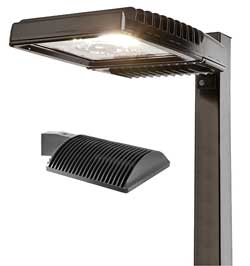An LED street light used to be a rare sight, but not any longer. More cities are turning to diode technology to illuminate their roads at night, and for good reason. Diode fixtures offer a superior set of features and specs, and are poised to render high discharge lamps obsolete in a lot of settings. As high discharge lamps have traditionally been the dominant form of nighttime illumination, it’s impressive for a young technology like diode fixtures to make such an impact so quickly. And as time goes on, diode fixtures are only becoming more cost effective and more available, ensuring they are the technology of choice going forward.
The Benefits of an LED Street Light

- Superior watt to lumen outputs. The hallmark of diode technology is its excellent efficiency, most clearly defined by its unmatched power to output ratio. A diode fixture can output a comparable amount of illumination for a fraction of the power, largely due to its design. Diode fixtures are directional in nature, so they don’t require the bulky mirrors and ballasts that metal halides do. This means fewer losses during reflecting. Diode fixtures also run on a far more reliable foundation in solid state electronics, so there are fewer system losses overall. All of this adds up to energy savings over the lifetime of the system.
- Fewer maintenance costs. A limitation for most systems is how much it costs to maintain then, as metal halides and pressurized sodium fixtures have to be replaced more often. Diode fixtures are practically maintenance free for several years following installation, and even if a single diode chip burns out early, it won’t noticeably affect the fixture’s output. Less frequent maintenance means lower operating costs and a lower likelihood of the system experiencing a failure during a critical moment.
- Lighter weight and more durable. During inclement weather, the inherent fragility and heaviness of a metal halide or pressurized sodium fixture will be a major liability. An LED street light is much lighter than comparable fixtures and more durable. As a result, diode fixtures almost always withstand high winds and punishing storms without suffering damage.
- Superior controllability. Cities and property owners want more control over their lighting systems, and diode fixtures can give that. Because they are built on solid state electronics, diode fixtures can be attached to many types of controls, like dimmers, motion controls or timers. Diode fixtures can even be ordered to flash, which can be helpful in directing emergency personnel to an accident site.
Diode technology is an upgrade across the board, and represents the next evolution in citywide street illumination.






